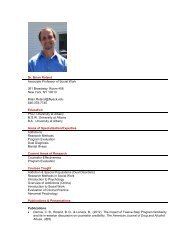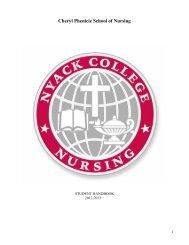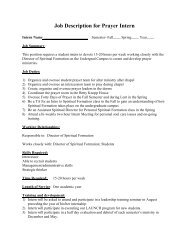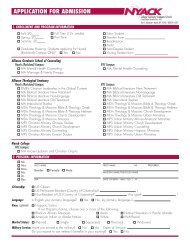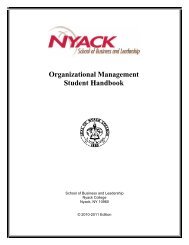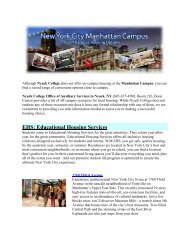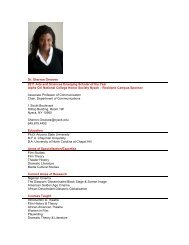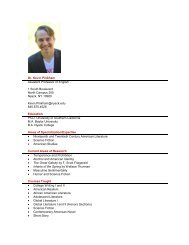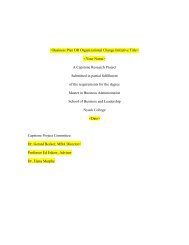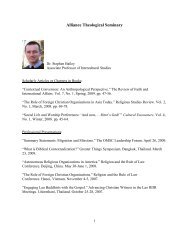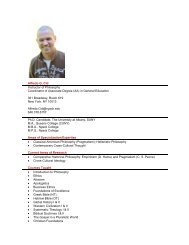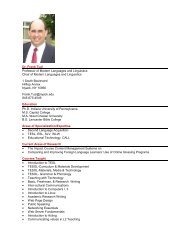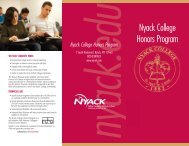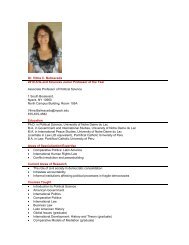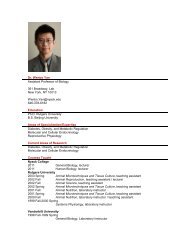SCHOLARSHIP AND GLOBAL ENGAGEMENT ... - Nyack College
SCHOLARSHIP AND GLOBAL ENGAGEMENT ... - Nyack College
SCHOLARSHIP AND GLOBAL ENGAGEMENT ... - Nyack College
You also want an ePaper? Increase the reach of your titles
YUMPU automatically turns print PDFs into web optimized ePapers that Google loves.
FEB<br />
21<br />
2013<br />
THE CENTER FOR<br />
<strong>SCHOLARSHIP</strong><br />
and Global<br />
Engagement<br />
at <strong>Nyack</strong> <strong>College</strong> presents<br />
The Fourth Annual<br />
NYACK<br />
SCHOLARS<br />
SYMPOSIUM<br />
Supported by the U.S. Institute of Peace<br />
Public Education for Peacebuilding<br />
Support Initiative<br />
In Search of<br />
Peace and Justice:<br />
Contributions<br />
Across the<br />
Disciplines
From The President<br />
Dear Friend,<br />
Welcome to the winter 2013 <strong>Nyack</strong> Scholars Symposium!<br />
Since its inception just a few short years ago, <strong>Nyack</strong>’s Center for Scholarship and<br />
Global Engagement (CSGE) has become a vital expression of one of our five core<br />
values—academic excellence. In previous years, professors gathered for an event<br />
called the Faculty Scholarly Dialogue, a multidisciplinary forum to discuss topics and<br />
issues of mutual interest. This initiative birthed today’s <strong>Nyack</strong> Scholars Symposium—<br />
an expanded presentation for the entire campus community to experience the result<br />
of our faculty’s studies funded by research grants.<br />
This annual symposium is now a tradition established through the efforts of a planning<br />
committee headed by Dr. Vilma “Nina” Balmaceda, our CSGE director. Showcasing<br />
our extraordinarily accomplished faculty and exceptionally talented students, we are<br />
pleased to offer this learning opportunity at both the Rockland County and New York<br />
City campuses.<br />
This year, we are impressed that among the three distinguished plenary speakers is<br />
one of our own, Mr. Benjamin Raber, a 2007 <strong>Nyack</strong> alumnus. His co-presenters, Ms.<br />
Lisa Dougan and Ms. Anna Lee round out the roster of exemplary scholars who are<br />
following their passion for serving others in our nation and around the world.<br />
May you be inspired and re-energized in your pursuit of lifelong learning!<br />
Wisdom is the principal thing; therefore get wisdom: and with all thy<br />
getting get understanding (Proverbs 4:7.)<br />
With warm regards,<br />
Michael G. Scales, Ed.D.<br />
President
Fourth Annual <strong>Nyack</strong> Scholars Symposium<br />
Rockland Campus<br />
Thursday, February 21, 2013<br />
Plenary Session 9:35 a.m. - 11:00 a.m.<br />
VENUE<br />
Bowman<br />
Gymnasium<br />
PRESENTERS<br />
Lisa Dougan<br />
Director of Civil Engagement and D.C. Representative for Invisible Children<br />
Benjamin Raber<br />
Executive Director, Network, Chambersburg, PA<br />
Anna Lee<br />
Senior Americas Policy Officer, Christian Solidarity Worldwide, Washington, D.C.<br />
Dr. Vilma “Nina” Balmaceda, Moderator<br />
Director, Center for Scholarship and Global Engagement, <strong>Nyack</strong> <strong>College</strong>, NY
Breakout Session 1 – Main Campus 11:15 a.m. - 12:15 p.m.<br />
VENUE ROOM PRESENTER TOPIC<br />
Simpson 200B Kevin Pinkham, Ph.D.<br />
Boon Center 406 Stephen Bennett, Ph.D.<br />
We Are the Walking Dead: Peace, Justice, and<br />
Zombies<br />
Justice Like Waters: Justice and Oppression in<br />
the Book of Amos<br />
Hilltop 1<br />
Gwen Parker-Ames, Ed.D.<br />
& Suzanne Toliao, M.A.<br />
Orienting the Map Between Two Worlds in<br />
Search of Peace and Social Justice<br />
Boon Center 412 Inseon Hwang, Ph.D. Can Nurses Advance Social Justice<br />
Hilltop 4 James Romaine, Ph.D. The Visual Arts as a Medium of Christian Ethos<br />
Simpson 200A Jack Wiltshire, Psy.D.<br />
Craig Ellison’s Concept of Shalom Applied to<br />
Social Justice and Peace<br />
Boon Center 401 Chantal Parmley Consensual: Sexual Justice in a Perverse Society<br />
Boon Center 408 Paul Van Houten Inadequacy: Public School Funding and Control<br />
Breakout Session 2 – ATS 11:30 a.m. – 1:30 p.m. *<br />
VENUE ROOM PRESENTER TOPIC<br />
Faculty and Graduate Student Panel: In Search of Peace and Justice: Opportunities<br />
for Social Investment by the Church hosted by Jaime Castañer-Weiss<br />
ATS 350<br />
Vilma “Nina” Balmaceda,<br />
Ph.D.<br />
Rethinking the Local Church in Light of the Call<br />
to Do Justice and Love Mercy<br />
ATS 350 Yumi Li Persons with Disabilities and the Church<br />
ATS 350 José Montes Wealth and the Urban Church<br />
ATS 350 Kenny Sullivan Race and the Church<br />
*Lunch will be provided to all participants during the session.
Breakout Session 3 – Main Campus 1:15 p.m. - 2:15 p.m.<br />
VENUE ROOM PRESENTER TOPIC<br />
Hilltop 1 Brad McDuffie, M.A.<br />
Pardington AUD Marie Kenote, D.M.A.<br />
Hilltop 5 Andrew Mercurio, D.Min.<br />
Nothing to Sustain Us But the Counsel of Our<br />
Fathers: The Counsel of Ernest Hemingway on<br />
the Fiction of Cormac McCarthy<br />
JS Bach, A Man of Passion, Purpose, and<br />
Position: The Excellence, Variety, and Message<br />
of Bach’s Music for the Transverse Flute<br />
Reclaiming Sexuality: A Mandate for<br />
Contemporary Christianity<br />
Hilltop 7<br />
Elio Cuccaro, Ph.D. and<br />
James Cowman, D.Min.<br />
Making it Memorable: Composing Sermons to<br />
Last Beyond Sunday Morning<br />
Boon Center 403 Jung Hang Lee, Ph.D.<br />
The Last Frozen Land, North Korea: What Do<br />
They Teach in Mathematics<br />
Boon Center 406 Ron Belsterling, Ph.D.<br />
The Impact of Religiosity on Marriage: The Last<br />
30 Years of Research Considered<br />
Hilltop 4<br />
Larry Poston, Ph.D. and<br />
Stuart Guild<br />
After the Love Has Gone: The Historical Effects<br />
of Revivalism<br />
Sky Island 101 Gordon Boronow, Ph.D.<br />
Social Security Reform in an Economy Subject<br />
to Temptation<br />
Boon Center 412 Michael Huster, Ph.D.<br />
Continuity and Discontinuity: Science and the<br />
Christian Faith<br />
Simpson 200A James Danaher, Ph.D. Skepticism: The Wisdom of Not Knowing<br />
Boon Center 411 Christopher Choi The Perplexity of the Minister<br />
Boon Center 401 Christopher Rafalski<br />
Apostasy in Islam: The Implications for Christian<br />
Converts<br />
Boon Center 408 Marvin Salvatore Immobilization and the Body Systems
Breakout Session 4 – Main Campus 2:30 p.m. – 3:30 p.m.<br />
VENUE ROOM PRESENTER TOPIC<br />
Boon Center 401 Christine Buel, Ph.D.<br />
Reforming the Altruist: Novice Teachers in Faith-<br />
Based Universities<br />
Hilltop 4 Damaris-Lois Lang, Ph.D. Exploring Paternal Care in the Prairie Vole<br />
Boon Center 406<br />
Len Kageler, Ph.D. and<br />
Anna Bailey<br />
Foundations and Models of Muslim Youth Ministry<br />
Boon Center 412 Michael Huster, Ph.D.<br />
Continuity and Discontinuity: Science and the<br />
Christian Faith<br />
Simpson 200A James Danaher, Ph.D. Skepticism: The Wisdom of Not Knowing<br />
Hilltop 7 David Emanuel, Ph.D. Early Solutions to Biblical Problems<br />
Hilltop 1 Brad McDuffie, M.A.<br />
Hilltop 6 Frank Tuzi, Ph.D.<br />
Hilltop 8 Steven Ware, Ph.D.<br />
Nothing to Sustain Us But the Counsel of Our<br />
Fathers: The Counsel of Ernest Hemingway on<br />
the Fiction of Cormac McCarthy<br />
Making Web-Based Education Equitable for All<br />
Users<br />
The Stones of Easter, Lithic Inscriptions of<br />
the Pascal Cycle in the Late Ancient and Late<br />
Medieval Periods<br />
Boon Center 408<br />
Marie White, Ph.D. and<br />
Miriam Velez, M.S.<br />
Underprepared Does Not Mean Unsuccessful!<br />
International Celebration Dinner, Boon Center Cafeteria, 5:00 p.m. – 7:00 p.m.
<strong>Nyack</strong>’s Center for Scholarship and Global Engagement<br />
ABOUT NYACK COLLEGE’S<br />
Center for Scholarship and Global Engagement:<br />
A Christ-centered community fostering scholarly inquiry and global<br />
awareness<br />
By Dr. Vilma “Nina” Balmaceda, CSGE Director<br />
The Center for Scholarship and Global Engagement would like to thank the U.S.<br />
Institute of Peace for their support which makes our Fourth Annual Scholars<br />
Symposium on the Rockland County campus of <strong>Nyack</strong> <strong>College</strong> possible.<br />
The Center for Scholarship and Global Engagement (CSGE) exists to promote and<br />
sustain a culture of scholarly inquiry and global awareness at <strong>Nyack</strong> <strong>College</strong>, Alliance<br />
Theological Seminary, and in the communities that surround our campuses. We<br />
are committed to fulfill our mission by remaining true to <strong>Nyack</strong>’s five institutional<br />
core values of being academically excellent, globally engaged, intentionally diverse,<br />
personally transforming, and socially relevant.<br />
CSGE is intentional about fostering:<br />
• Collaborative Initiatives: Looking for opportunities to initiate local, regional,<br />
and international partnerships and projects to promote research and global<br />
awareness, recognizing that everyone in the <strong>Nyack</strong> community has a role in this<br />
process.<br />
• Scholarly Inquiry: Working to promote a culture of critical reflection and sound<br />
research in the context of Christ-centered ideals.<br />
• Global Awareness: Seeking to raise consciousness on international issues and<br />
serve as a catalyst for effective involvement.<br />
• Encouraging community: Nurturing an engaged intellectual and welcoming<br />
community that fosters open, constructive, and respectful dialogue on complex<br />
issues, where differing views can be addressed with civility and integrity.<br />
Our Fourth <strong>Nyack</strong> Scholars Symposium, “In Search of Peace and Justice:<br />
Contributions Across the Disciplines,” is an invitation to our whole community to<br />
reflect and consider relevant ideas, research, and actions in the pursuit of shalom,<br />
the holistic well-being of our community and society, promoting reconciliation and<br />
confronting the multiple expressions of injustice in the world.<br />
We are deeply grateful to our plenary speakers, our panelists, and to the presenters,<br />
responders, and chairs in each of the breakout sessions, for sharing their wisdom on<br />
these most relevant topics with all of us.<br />
For more information, contact the Center for Scholarship and Global Engagement at<br />
Center_Scholarship@nyack.edu or visit our webpage www.nyack.edu/CSGE.
About The Plenary Speakers<br />
Lisa Dougan<br />
Lisa Dougan serves as the Director of Civic<br />
Engagement for Invisible Children. Based in<br />
Washington, D.C., Lisa represents the organization<br />
to the policy community and implements advocacy<br />
campaigns focused on protecting civilians and<br />
ending the violence of the Lord’s Resistance<br />
Army (LRA). Since 2009, Lisa has developed and<br />
executed nation-wide advocacy campaigns that<br />
have played a critical role in advancing U.S. policy<br />
toward on the LRA crisis.<br />
In 2010, she joined President Obama for the<br />
signing of the landmark LRA Disarmament and Northern Uganda Recovery Act,<br />
which mandated the President to issue the first comprehensive U.S. strategy to<br />
help address the crisis, after Invisible Children’s campaigning helped secure its<br />
passage. Prior to her current role as Director of Civic Engagement, Lisa also served<br />
as Invisible Children’s National Tour Coordinator and as Director of Field Outreach<br />
for The Resolve, an LRA-focused advocacy and policy analysis organization based in<br />
Washington, D.C.<br />
Anna Lee is the Senior Americas Policy Officer for Christian Solidarity Worldwide<br />
(CSW), an international religious freedom NGO with headquarters in Washington, D.C.<br />
Anna Lee has a BA from Randolph-Macon Woman’s <strong>College</strong> in International Relations<br />
and an MA in Conflict Resolution from Lancaster University (UK). She was the director<br />
of CSW’s European Union Liaison office for eleven years, in charge of working with the<br />
EU institutions on religious freedom issues in third world countries. She also covers<br />
religious freedom issues in Latin America for CSW, with a current focus on Colombia,<br />
Cuba, and Mexico and some long term advocacy work on Peru.<br />
In 2011, she relocated to Washington, D.C. where<br />
Anna Lee<br />
she is setting up a new advocacy office focused on<br />
working with the U.S. government on incorporating<br />
religious freedom concerns in its foreign policy. She is also working with Latin<br />
American governments, encouraging them to take a proactive role in promoting<br />
religious freedom, human rights, and democracy around the world.<br />
6<br />
Fourth Annual <strong>Nyack</strong> Scholars Symposium
Benjamin Raber graduated from <strong>Nyack</strong> <strong>College</strong><br />
in New York in 2007, and currently resides in<br />
Chambersburg, PA with his lovely wife Stephanie<br />
and their daughter Taliya. Ben serves as the<br />
Executive Director of NETwork Ministries, a Christcentered<br />
non-profit organization dedicated to<br />
equipping vulnerable children and young adults with<br />
the skills necessary for spiritual growth, academic<br />
achievement, life management, and Christian<br />
leadership.<br />
Benjamin Raber<br />
The ministry uses afterschool programs, a<br />
community garden, basketball, and the arts as springboards for building relationships<br />
with youth and sharing the good news of Jesus. Ben and Steph also serve as<br />
leaders with their church, Overflow Ministries, and they are committed to loving their<br />
neighbors and encouraging the church to creatively engage with local, national, and<br />
global issues from a kingdom perspective.<br />
This session will be hosted by Vilma “Nina” Balmaceda, Ph.D.<br />
Dr. Balmaceda is the Center for Scholarship and<br />
Global Engagement director and an associate<br />
professor of political science at <strong>Nyack</strong> <strong>College</strong>.<br />
Born and raised in Lima, Peru, she earned her<br />
law degree at the Pontifical Catholic University of<br />
Peru’s Law School. She holds master’s degrees<br />
in International Peace Studies, and in Government<br />
and International Studies and a Ph.D. in Political<br />
Science by the University of Notre Dame.<br />
She serves as a board member in several<br />
Vilma “Nina” Balmaceda, Ph.D.<br />
non-profit organizations, including Advocates<br />
International, Inc.; the Inter-American Federation<br />
of Christian Lawyers; and the Christian Legal Society of Peru, which she founded in<br />
2001. She also serves as a member of the Advocates International Global Council<br />
and as Peacemaker Ministries’ Representative for Latin America.<br />
In Search of Peace and Justice<br />
7
About Our ATS Faculty & Graduate Student Panelists<br />
Yumi Li<br />
Persons with Disabilities and the Church<br />
Yumi Li was born in Busan, South Korea in 1983 and came to the U.S. in 2008 with<br />
plans to further her studies in music. However, there she found the wonderful work of<br />
God in missions for people with disabilities and their families.<br />
She is currently pursuing her master’s degree at Alliance Theological Seminary and<br />
serves as a youth ministry pastor at Hyoshin Presbyterian Church in Flushing, NY.<br />
Rev. José Carlos Montes<br />
Wealth and the Urban Church<br />
Rev. José Carlos Montes will complete his Master of Divinity in Bible and Theology at<br />
Alliance Theological Seminary in May 2013. He is an ordained minister of word and<br />
sacrament, and a writer, teacher, speaker, and advocate of captivity theology and<br />
holistic ministry. He is the associate pastor and elder of the Sanctuary Church, and<br />
special assistant to the president of the Latino Pastoral Action Center in the Bronx.<br />
He helped Rev. Dr. Raymond Rivera produce his book, Liberty to the Captives: Our<br />
Call to Minister in a Captive World.<br />
Before full-time ministry, he was a foundation program officer, community education<br />
project director, and crime prevention organizer. Rev. Montes holds a B.A. in political<br />
science from Yale University.<br />
8<br />
Fourth Annual <strong>Nyack</strong> Scholars Symposium
In Search of Peace and Justice: Opportunities for Social Investment by the Church<br />
Race and the Church<br />
Kenneth Sullivan is a native of Northern Jersey.<br />
Born in Paterson and raised in Teaneck, Kenneth<br />
left NJ to pursue a degree in biology at Morehouse<br />
<strong>College</strong>. Subsequent to his matriculation, Kenneth<br />
worked as a senior laboratory technician for a<br />
major medical device company and later taught<br />
fifth and seventh grade science.<br />
Kenneth is pursuing his M.Div. at Alliance<br />
Kenneth Sullivan<br />
Theological Seminary while serving as high school<br />
youth pastor at Grace Evangelical Free Church in Stamford, CT.<br />
Rethinking the Local Church in<br />
Light of the Call to Do Justice and<br />
Love Mercy<br />
At Alliance Theological Seminary, Dr. Balmaceda<br />
teaches several courses including, The Church as<br />
a Social and Cultural Institution, Leading Change in<br />
the Church, and History and Theory of International<br />
Development. She also leads the Research<br />
Methodology Seminar in the Doctor of Ministry<br />
program.<br />
Vilma “Nina” Balmaceda, Ph.D.<br />
This session will be hosted by<br />
Jaime R. Castañer Weiss<br />
Jaime was born and raised in Puerto Rico and<br />
has been living in New York for the past four and<br />
a half years. He met his wife Lidia while studying<br />
engineering. They have been married for nearly six<br />
years. They are a part of a vibrant faith community<br />
at Living Christ Church in <strong>Nyack</strong> where they serve<br />
as interns.<br />
Jaime R. Castañer Weiss<br />
Jaime is an M.Div. candidate at Alliance Theological<br />
Seminary and is on staff with InterVarsity Christian<br />
Fellowship as a campus minister advancing a witnessing community at Ramapo<br />
<strong>College</strong> in Mahwah, NJ.<br />
In Search of Peace and Justice<br />
9
About Our Faculty Presenters<br />
Gwen Parker Ames, Ed.D.<br />
Suzanne Toliao, M.A.<br />
Orienting the Map Between Two Worlds in Search of Peace<br />
and Social Justice<br />
A preliminary research study of former gang members who seek to reorient their life<br />
map to achieve personal peace and social justice at a Christian college. This research<br />
study will highlight individual stories of students at various stages of their evolutionary<br />
journey. It will also explore the pre-conceived notions of the Christian college<br />
experience, and its role in promoting and/or addressing self-efficacy, ambitions,<br />
challenges, and triumphs.<br />
Gwen Parker Ames is the associate dean of the Division of Student Success at<br />
<strong>Nyack</strong> <strong>College</strong> and an adjunct professor in Family and Child Studies at Montclair<br />
State University. She holds a doctorate in education from Teachers <strong>College</strong> Columbia<br />
University and has completed post-graduate study in Youth and Family Ministry at<br />
Princeton Theological Seminary.<br />
She is the licensed minister of Youth and Family Programs at St. Paul Baptist Church<br />
in Montclair, NJ. She and her husband Donald Ames are the proud parents of a<br />
college age son, Alex.<br />
Suzanne Toliao works in the Division of Student Success at <strong>Nyack</strong> <strong>College</strong>. She holds<br />
a master’s degree in Reading and Educational Media from Montclair State University<br />
and is currently pursuing her doctorate in education at Northcentral University,<br />
focusing on Curriculum and Instruction.<br />
She was the recipient of the 2010 Academic Advising Excellence Award from the<br />
National Academic Advising Association (NACADA) for Region One.<br />
10 Fourth Annual <strong>Nyack</strong> Scholars Symposium
The Impact of Religiosity on Marriage:<br />
The Last 30 Years of Research Considered<br />
Ron Belsterling, Ph.D.<br />
Most research indicates that religion positively impacts marriage (Bradford & Nock,<br />
2006; Marks, 2004). Invervening issues leading to inconsistent findings relate<br />
mostly to variable construction, absence of theory, research design, and interfaith<br />
marriage matters (Hunt, 1994; Larson & Goltz, 1989; Sullivan, 2001). Despite<br />
variable construction problems, religiosity shows to positively correlate specifically to<br />
individual well-being, marital satisfaction, marital stability, and parenting competency<br />
(Call & Heaton, 1997; Kirkpatrick & Shaver, 1992; Wilson & Filsinger, 1986).<br />
Conservative Christianity appears to relate more positively to marital satisfaction<br />
than with other religious perspectives (Barna, 2008). More specific research findings<br />
confirm general findings; Brutz and Allen (1986) conclude that lower levels of marital<br />
violence are associated with higher levels of religious participation. Gaps in the<br />
research will also be identified.<br />
Ron Belsterling has taught for 15 years at <strong>Nyack</strong> <strong>College</strong>. Before working at <strong>Nyack</strong>,<br />
Ron worked as a youth pastor and as a therapist/counselor. He graduated from<br />
Grove City <strong>College</strong> with a double major (religion & psychology) and earned an M.S. in<br />
Counseling from Villanova University, and a Ph.D. in education from Biola University.<br />
In Search of Peace and Justice<br />
11
About Our Faculty Presenters<br />
Stephen Bennett, Ph.D.<br />
Justice Like Waters: Justice and Oppression in the Book of<br />
Amos<br />
The assertion of Amos, “Let justice roll like waters, and righteousness like a neverending<br />
stream,” is a very well-known declaration quoted in the famous speech<br />
delivered by Rev. Dr. Martin Luther King, Jr. at the 1963 Washington, D.C. Civil Rights<br />
March. This verse was also quoted in a speech by President Ronald Reagan and<br />
others, a testament to its powerful imagery against oppression.<br />
Social injustice was the situation that drove the prophecies of Amos in eighth century<br />
B.C. Israel. Amos complained about injustices that were the equivalent of murder<br />
because they led to the starvation and death of those oppressed. While the economy<br />
of eighth century B.C. Israel looked good under the leadership of Jeroboam II, the<br />
opulence of a few was a thin mask over the rotten practices that were eating away at<br />
the prosperity of the nation. Amos called out for justice in the marketplace (because<br />
of illegal weights). The Old Testament system of a fair portion of land for every family<br />
had been compromised by the greed of the powerful. In an agricultural economy, the<br />
wealth was tied to the land.<br />
Stephen J. Bennett is professor of Old Testament at <strong>Nyack</strong> <strong>College</strong>. He received<br />
his Ph.D. from Manchester University in 1995. He has published the Ecclesiastes/<br />
Lamentations volume in the New Beacon Bible Commentary series (2010) and wrote<br />
a chapter for The Bible Tells Me So (2011). He has written entries for the Wynkoop<br />
Center for Women in Ministry (2007) and the Lexham Bible Dictionary (2012).<br />
Bennett also has publications in the journals including, The Mediator (2001-3),<br />
International Review of Mission (2002), and Literature and Theology. He has written<br />
book reviews for Themelios (2011) and the Toronto Journal of Theology.<br />
12 Fourth Annual <strong>Nyack</strong> Scholars Symposium
Social Security Reform in an Economy Subject to<br />
Temptation<br />
Gordon C. Boronow, Ph.D.<br />
Economists have studied the behavior of decision makers for many years to better<br />
understand seemingly irrational behavior. For example, why do people save so<br />
little for retirement They have developed a model of decision making affected by<br />
temptation (a preference for consumption now rather than consumption later). Dr.<br />
Boronow used this model to study the effect of temptation on a dynamic market<br />
economy which has a social security system. Testing alternative designs for Social<br />
Security, he will show that temptation has a significant effect, and that under an<br />
alternative design to the present system, the effects of temptation can be mitigated.<br />
Gordon C. Boronow is an assistant professor in the School of Business and<br />
Leadership at <strong>Nyack</strong> <strong>College</strong>. He received his Ph.D. in economics from Stony<br />
Brook University. His research interests are macro-economics, social insurance, and<br />
behavioral economics. Prior to his academic career, Dr. Boronow worked in the<br />
financial services industry. He became a Fellow of the Society of Actuaries in 1980.<br />
Equitable Life (NYC, NY), Tillinghast (NY, NY), Connecticut Mutual Life (Hartford, CT)<br />
and American Skandia Life Assurance Corp. (Shelton, CT) are major companies<br />
where he spent his actuarial career. He was a pioneer in both variable and universal<br />
life insurance policy design, and is the inventor of a patented actuarial mechanism to<br />
incorporate investment performance in the design of an immediate variable annuity.<br />
In Search of Peace and Justice<br />
13
About Our Faculty Presenters<br />
Christine Buel, Ph.D.<br />
Reforming the Altruist: Novice Teachers in Faith-Based<br />
Universities<br />
The definition and substance of altruism has been sacrificed at the altar of modern<br />
secular reasoning to such an extent that the average person finds it unrecognizable<br />
and naively idealistic. Dawkins, famed atheist, noted that humanity’s only recourse<br />
is to rebel against the inevitable grip of the selfish gene in an attempt to develop<br />
a form of disinterested altruism. Ironically, unexamined altruistic motivations often<br />
result in a failure to grasp the moral and cultural understanding required to work<br />
with diverse people groups. However, social justice advocates support the notion<br />
that when construed as a balanced framework, altruism takes on both a relational<br />
and rational dimension that allows the future or novice teacher to embrace both the<br />
knowledge traditions and lived experiences of marginalized and oppressed groups.<br />
The presentation will summarize and discuss the findings of a mixed methods study<br />
designed to determine the altruistic expectations of future teachers enrolled in<br />
faith-based universities. Study data was collected via the Personal Expectations of<br />
Teaching (PET) self-report questionnaire designed by Friedman (2006). Data findings<br />
will interest both college students and educators who plan to work with individuals<br />
from poverty and other high-need contexts.<br />
Dr. Christine Buel currently teaches in the School of Education at <strong>Nyack</strong> <strong>College</strong>. Her<br />
teaching passions include children’s literature and literacy courses. As a fifteen-year<br />
veteran in the School of Education, Dr. Buel first and foremost enjoys relationships<br />
with students and helping them find their place in God’s kingdom. She presented her<br />
recent doctoral research at the International Council of Christian Teacher Educators<br />
conference at Azusa Pacific University.<br />
14 Fourth Annual <strong>Nyack</strong> Scholars Symposium
Elio Cuccaro, PH.D.<br />
James Cowman,D.Min.<br />
Making It Memorable: Composing Sermons to Last Beyond<br />
Sunday Morning<br />
It is certainly no exaggeration to say that the great majority of sermons preached in<br />
the church of Christ today are “Sunday morning specials,” limited in their impact to<br />
the immediacy of the Sabbath day’s worship. If asked a day later (let alone a week or<br />
a month or a year), the average parishioner would only retain a vague idea of what<br />
the pastor preached. That is a serious shortcoming, since for most people the only<br />
spiritual food they get to sustain them week-by-week is the Sunday morning feeding<br />
of the Word. There are, of course, notable exceptions, sermons that stick to the mind<br />
like indelible print, and continue to nurture the flock long past Sunday. The distinctive<br />
qualities of these “sticky” sermons is worth considering, even if their inclusion<br />
imposes upon the speaker an additional layer of sermon preparation.<br />
Dr. Elio Cuccaro grew up in Italy. He was educated at Cornell University (B.S. in<br />
Molecular Biology), Biblical Theological Seminary (M.Div., S.T.M. in New Testament),<br />
and Drew University (M.Phil., Ph.D. in Historical Theology). He was ordained as a<br />
minister by the C&MA in 1987. His primary occupation has been as a professor at<br />
<strong>Nyack</strong> <strong>College</strong> in the areas of biblical, theological and pastoral studies. He has also<br />
served as a frequent speaker, pastor of the Tappan Alliance Church, senior editor of<br />
Christian Publications, and homiletics teacher and consultant for the Salvation Army<br />
Officer Training School. He resides in Congers, NY with his wife Agatha. His current<br />
most urgent concern is the completion of a homiletics primer for adult learners for<br />
the Salvation Army.<br />
Jim Cowman has served 27 years as senior pastor in three Christian and Missionary<br />
Alliance churches and for 12 years on the Great Lakes District Ordaining Council.<br />
Presently, he is the senior pastor of Wyandotte Alliance Church in Wyandotte, MI. He<br />
is also an adjunct online professor of theology for Crown <strong>College</strong> in St. Bonifacius,<br />
MN. He studied liberal arts at West Virginia University in Morgantown, WV (1976<br />
-1978) and earned a B.S. degree in pastoral ministry from <strong>Nyack</strong> <strong>College</strong> (1980).<br />
Subsequently, he received a Master of Divinity (1984) and Doctor of Ministry (2005)<br />
with a concentration in pastoral ministry from Trinity Evangelical Divinity School in<br />
Deerfield, IL.<br />
In Search of Peace and Justice<br />
15
About Our Faculty Presenters<br />
James P. Danaher, Ph.D.<br />
Skepticism: The Wisdom of Not Knowing<br />
As our understanding of the human condition has changed, so must our understanding<br />
of truth change. We now know that we are interpretive beings and the human condition<br />
is a hermeneutic condition. Consequently, our quest for truth and meaning must<br />
begin with an understanding of our hermeneutic nature. In this context, a concept of<br />
truth is suggested that is very different from the modern concept of truth we inherited<br />
from our Enlightenment ancestors. It is, however, a concept of truth that lies behind<br />
all genuine intellectual and spiritual journeys and is the cause of our advance as a<br />
species.<br />
James P. Danaher is professor of philosophy and head of the Philosophy Department<br />
at <strong>Nyack</strong> <strong>College</strong>, <strong>Nyack</strong>, NY. He is the author of Contemplative Prayer: A Theology<br />
for the 21st Century (Cascade, 2011), Jesus after Modernity: A 21st Century Critique<br />
of Our Modern Concept of Truth and the Truth of the Gospel (Pickwick, 2011), Eyes<br />
that See, Ears that Hear: Perceiving Jesus in a Postmodern Context (Liguori, 2006),<br />
Postmodern Christianity and the Reconstruction of the Christian Mind (Academica<br />
Press, 2001), and over seventy articles that have appeared in a variety of philosophy<br />
and theology journals.<br />
16 Fourth Annual <strong>Nyack</strong> Scholars Symposium
David Emanuel, Ph.D.<br />
Early Solutions to Biblical Problems<br />
While reading through the Old Testament, it is difficult to ignore the nagging questions<br />
with which the biblical authors seem to tantalize us. Take Genesis, for example, where<br />
we read how the serpent entices Eve into eating fruit from a forbidden tree and is<br />
consequently cursed to crawl on its belly (Gen 3:14). A simple account such as this,<br />
begs the question, “What did the serpent look like before it was cursed” Further on<br />
in Genesis, we read the story of Cain and Abel and are left with the question of why<br />
Abel’s offering was more acceptable than Cain’s. Additionally, after God banishes Cain<br />
to being a wanderer in the land he places a mark upon him for protection (Gen 4:15);<br />
but what exactly did that mark look like Questions such as these are not restricted<br />
to contemporary readers of the Bible; they were also recognized and addressed by<br />
readers and translators from antiquity. The present paper explores a selection of<br />
textual issues, such as those mentioned above, and discusses some of the solutions<br />
proposed by the early interpreters and translators of the Old Testament.<br />
David Emanuel graduated from the University of London with an M.Sc. in computer<br />
science in 1997, and soon after gave up a successful career in computing and<br />
telecommunications to pursue his interest in the Hebrew Bible. He completed<br />
another master’s (Bible and Ancient Near East) in 2001, and a Ph.D. (Hebrew Bible/<br />
Old Testament) at the Hebrew University in 2007. He has written numerous articles<br />
on Hebrew grammar for the BibleMesh project, and provided the Hebrew audio<br />
recordings for the program.<br />
In Search of Peace and Justice<br />
17
About Our Faculty Presenters<br />
Michael Huster, Ph.D.<br />
Continuity and Discontinuity: Science and the Christian<br />
Faith<br />
Science is based on the repeatability and continuity of nature. Physicists probe<br />
and test these features of nature. On the other hand, the Christian faith proposes a<br />
God who acts to disturb this continuity, by creating it, providentially guiding events,<br />
causing miracles, and granting free will to creatures. I will present some evidence<br />
from physics and astronomy showing the consistency of physical laws across time<br />
and space. I will also show some data indicating that physical laws are also obeyed in<br />
the human brain. I suggest a parallel between how the mind works through the brain<br />
and how God works through nature. Finally, I arrive at a resolution that draws on a<br />
deeper continuity between science and the Christian faith.<br />
Michael Huster was raised in southern California and majored in physics at the<br />
University of California at Santa Barbara. He received M.S. and Ph.D. degrees in<br />
physics from the University of Pennsylvania. After a two-year post-doctoral position<br />
at MIT, Dr. Huster worked in industry designing the next generation of sonar for<br />
the Navy. During that time he participated in a number of at-sea tests. He taught at<br />
Simpson University in Redding, CA from 2000 to 2010 and began teaching at <strong>Nyack</strong><br />
<strong>College</strong> in 2011. He teaches physics, physical science, and astronomy at <strong>Nyack</strong>’s<br />
Manhattan and Rockland campuses.<br />
18 Fourth Annual <strong>Nyack</strong> Scholars Symposium
Inseon Hwang, Ph.D.<br />
Can Nurses Advance Social Justice<br />
Social justice is an embedded concept in the history of nursing. Code of Ethics for<br />
Nurses published by American Nurses Association (2010) states, “nursing has a<br />
distinguished history of concern for the welfare of the sick, injured, and vulnerable<br />
and for social justice.” The guidelines of Code of Ethics are based on moral and<br />
ethical principles. According to The Essentials of Baccalaureate Education for<br />
Professional Nursing Practice (2008), one of the cultivating values of professionalism<br />
and professional values is social justice. Social justice is defined as “acting in<br />
accordance with fair treatment regardless of economic status, race, ethnicity, age,<br />
citizenship, disability, or sexual orientation.” However, social justice is merely a<br />
concept and is not a shared nursing value without orchestrated efforts to progress<br />
social justice. The nursing workforce reflects caring individuals rather than the<br />
communities except the realm in the public health nursing. Consequently, the nursing<br />
discipline failed to show the reason of advancement for social justice. The purpose<br />
of study is to examine the concept of social justice in nursing literature. Secondly,<br />
nurses’ efforts in social justice are discussed. Thirdly, the issues to advance social<br />
justice in nursing are inquired. Lastly strategies to incorporate social justice in nursing<br />
education and research are implied.<br />
Dr. Inseon Hwang is an assistant professor at <strong>Nyack</strong>’s Cheryl Phenicie School of<br />
Nursing and is the coordinator of the degree completion program for RNs. She has<br />
a B.S. and M.S. from Ewah Woman’s University in South Korea and a D.N.Sc. from<br />
Columbia University. Certified as wound, ostomy, and incontinence nurse and a family<br />
nurse practitioner, her interests are community health nursing, wound care, and<br />
primary care. She developed the curriculum for the nursing major at <strong>Nyack</strong> <strong>College</strong>.<br />
In Search of Peace and Justice<br />
19
About Our Faculty Presenters<br />
Len Kageler, Ph.D.<br />
Anna Bailey<br />
Foundations and Models of Muslim Youth Ministry<br />
There are over 1,350 mosques in the United States and another 350 in Canada.<br />
About 18% of these have youth programs. This paper, first of its kind on this topic,<br />
explores the growth, purpose, and nature of Islamic youth ministry. It also explores<br />
the, perhaps shocking, idea that the growth of Islamic youth ministry in North America<br />
may be a good thing for the Christian youth group, the Christian family, and the<br />
Christian Church. The research foundation of this paper is comprised of interviews<br />
with key Muslim youth work leaders, an examination of key source documents, and<br />
Muslim websites.<br />
Len Kageler is professor of Youth Ministry and associate dean of Faculty Development<br />
at <strong>Nyack</strong> <strong>College</strong>. He has an M.Div. from North American Baptist Seminary and a<br />
Ph.D. in sociology from Fordham University. He speaks to youth workers across the<br />
U.S. and in EU countries. Last spring he gave classroom lectures in the UK at the<br />
universities of Oxford, Cambridge, Bristol, and Nottingham. He has authored eight<br />
books for parents or youth workers and is a volunteer in youth ministry at a local<br />
church in <strong>Nyack</strong>.<br />
Anna Bailey is a senior studying youth ministry at <strong>Nyack</strong> <strong>College</strong>. She is co-captain of<br />
the Warriors volleyball team and is a member of the Warriors softball team as well.<br />
Anna currently serves as a volunteer youth leader at her father’s church, Calvary<br />
Alliance, in her hometown of Milford, CT.<br />
20 Fourth Annual <strong>Nyack</strong> Scholars Symposium
Marie Herseth Kenote, D.M.A.<br />
J. S. Bach - A Man of Passion, Purpose, and Position: The<br />
Excellence, Variety, and Message of Bach’s Music for the<br />
Transverse Flute<br />
Johann Sebastian Bach used the phrase Soli Deo Gloria (to God Alone the Glory) often<br />
at the end of a musical work. Does his use of this phrase prove that Bach gave God<br />
the glory, or does the music itself that express those words Did J. S. Bach really<br />
have a deep-seated Christian faith, or was he simply fulfilling his job description<br />
What is it about his music, sacred and secular, that moves people to experience<br />
the deepest of human emotions: pure love, boundless joy and hope, profound faith,<br />
and intense melancholic sorrow After a brief description of Bach’s life and enduring<br />
influence on later composers, we will look at some of Bach’s most famous works, and<br />
conclude with a discussion of Bach’s excellent and varied writing for the transverse<br />
flute.<br />
Dr. Kenote is professor of music at <strong>Nyack</strong> <strong>College</strong> in <strong>Nyack</strong>, NY. She enjoys<br />
performing and presenting classical and sacred music for audiences in various<br />
venues, including at <strong>Nyack</strong> <strong>College</strong>, monasteries, nursing homes, rehabilitation<br />
facilities, NLAM, and in churches in our nation and abroad. She performed as a<br />
substitute flutist with the New York Philharmonic for over 20 years (with whom she<br />
participated in radio and television broadcasts and recordings). Marie holds degrees<br />
in music from the New England Conservatory of Music (B.M.), the Juilliard School<br />
(M.M.), Rutgers University (D.M.A), and spent a year in Berlin as a Fulbright Scholar.<br />
In Search of Peace and Justice<br />
21
About Our Faculty Presenters<br />
Damaris-Lois Lang, Ph.D.<br />
Exploring Paternal Care in the Prairie Vole (Microtus<br />
ochrogaster)<br />
Prairie voles have been a favored laboratory study model for neuroendocrine research<br />
on pair-bonding for the last decade since most of the other rodent lab models lack<br />
the behavior, which has been shown to be influenced by the hormones vasopressin,<br />
dopamine, oxytocin, and corticosterone. They also represent an ideal system for<br />
investigation of other societal behaviors, such as parenting. Understanding the<br />
influence of hormones on neuronal function in a model organism may provide insights<br />
into human disorders associated with impaired societal functioning. The factors that<br />
influence the neuroendocrine regulation of parental behavior in males in comparison<br />
to females are nebulous. My research explores male parental activity in response<br />
to female sensory input. Focusing on the external sensory stimulation influencing<br />
hormonal changes, which may subsequently impact neuronal activation that control<br />
paternal care in prairie voles, Microtus ochrogaster.<br />
Dr. Damaris-Lois Yamoah Lang is a neuroscientist who earned her Ph.D. at the<br />
Graduate Center, CUNY. Dr. Lang attended medical school and holds two master’s<br />
degrees in biology. Her areas of expertise include neuroscience, human biology,<br />
microbiology, and anatomy and physiology. She is a member of several scientific<br />
communities including the Society for Neuroscience (SFN), Metropolitan Association<br />
of <strong>College</strong> and University Biologists (MACUB) and Human Anatomy and Physiology<br />
Society (HAPS). Outside of academia, Dr. Lang is involved in humanitarian services<br />
involving women and young adults, where she holds various executive positions.<br />
These organizations include the L.A.D.I.E.S. society where she serves as president;<br />
Save Our Women International (SOWI) as secretary and Hearts-Of-Fire (HOF) as<br />
treasurer.<br />
22 Fourth Annual <strong>Nyack</strong> Scholars Symposium
Jung Hang Lee, Ph.D.<br />
The Last Frozen Land - North Korea: What Do They Teach<br />
in Mathematics<br />
This research addresses mathematics education in one of the most closed countries<br />
in the world, North Korea. North Korean secondary school mathematics education<br />
is examined through review of North Korea’s social and educational structures as<br />
well as its political and ideological position. It is known that ideology permeates all<br />
aspects of life in North Korea, but how exactly do the ideological and substantive<br />
mathematical components interact in mathematics education there What concrete<br />
form does this interaction take in actual everyday teaching practice This research<br />
seeks to answer these questions based on interviews with former North Korean<br />
mathematics teachers and students who have found a refuge in South Korea.<br />
Participants responded to questions regarding typical ways teaching and learning<br />
were carried out in mathematics classes; the Workers’ Party’s influence in every<br />
aspect of education, from teacher education to curriculum and textbooks issued; and<br />
the impact the March of Suffering had on the teaching and learning of mathematics<br />
as well as its lingering effects in secondary mathematics education seen to this day.<br />
Jung Hang Lee earned his Ph.D. in mathematics education from Teachers <strong>College</strong>,<br />
Columbia University in 2007. He has a B.S. in computer programming and applied<br />
mathematics (Operations Research) and M.S. in applied mathematics (engineering<br />
mathematics). His main research interests are North Korean mathematics education,<br />
mathematics concept map and assessment. He recently published a book called<br />
Understanding North Korean Secondary School Mathematics Education.<br />
In Search of Peace and Justice<br />
23
About Our Faculty Presenters<br />
Brad McDuffie, M.A.<br />
Nothing to Sustain Us But the Counsel of Our Fathers: The<br />
Counsel of Ernest Hemingway on the Fiction of Cormac<br />
McCarthy<br />
That Cormac McCarthy’s early fiction owes a heavy debt to William Faulkner has long<br />
been established; however, in his fiction since All The Pretty Horses, critics have<br />
increasingly noted the influence of Ernest Hemingway. In his most recent novels,<br />
No Country for Old Men and The Road, Hemingway’s influence has become so<br />
pronounced that McCarthy has forced critics to take notice. As longtime Hemingway<br />
scholars such as H. R. Stoneback and Allen Josephs have noted, McCarthy has<br />
clearly marked himself as the literary descendant of Faulkner and Hemingway, and the<br />
proof of the lineage can be found within the artistic DNA of every novel that McCarthy<br />
has written. McCarthy does not run away from such comparisons, as he once told<br />
Richard B. Woodward, “The ugly fact is books are made out of books,” and “The novel<br />
depends for its life on the novels that have been written” (31). With this in mind, this<br />
essay will look at Hemingway’s influence upon McCarthy with special attention to the<br />
way Hemingway’s early stories have influenced his work.<br />
Brad McDuffie teaches at <strong>Nyack</strong> <strong>College</strong>. His book Teaching Salinger’s Nine Stories<br />
was published in the fall of 2011. His article, “For Ernest, With Love and Squalor:<br />
The Influence of Ernest Hemingway on the Life and Work of J. D. Salinger,” appeared<br />
in the spring 2011 edition of The Hemingway Review. He published his first book of<br />
poems in 2009--And the West Was Not So Far Away. His work has been published<br />
in various journals including the South Carolina Review, Aethlon and North Dakota<br />
Quarterly. He has also published articles in several books and journals. He received<br />
his M.A. from SUNY New Paltz in 2005 and is currently (2012) finishing his Ph.D. at<br />
Indiana University of Pennsylvania.<br />
24 Fourth Annual <strong>Nyack</strong> Scholars Symposium
Andrew Mercurio, D.Min.<br />
Reclaiming Sexuality: A Mandate for Contemporary<br />
Christianity<br />
Sexuality is innately good, created by God as both a gift of sacred illustration and<br />
sensual celebration. With the Fall, human sexuality has been perverted (theologically,<br />
psychologically, and sociologically) by silence, shame, and various manifestations<br />
of sin. Historically, most erotic and vibrant expressions of sexuality have been nonmonogamous,<br />
patriarchal, and biased toward the social elite, young and physically<br />
able. Historically, the Christian church has struggled with the theology, education<br />
and legislation of sexuality, often viewing it as sinful, even at times within the context<br />
of marriage. In view of a history of the church’s ambiguous and negative teachings<br />
about human sexuality, Christians today are challenged to shamelessly reclaim and<br />
proclaim sexuality as a gift of sensual celebration for marriage and sacred illustration<br />
for modernity.<br />
Dr. Mercurio is professor of Marriage and Family Therapy and Director of the<br />
Marriage and Family Therapy Program of Alliance Graduate School of Counseling/<br />
<strong>Nyack</strong> <strong>College</strong>. He has a M.Div. from Asbury Theological Seminary and a D.Min.<br />
from Palmer Theological Seminary/Eastern University. He is a licensed marriage and<br />
family therapist, a certified sex therapist (American Association of Sex Educators,<br />
Sex Counselors and Sex Therapists), an approved supervisor (American Association<br />
for Marriage and Family Therapy) and an ordained C&MA minister with ten years<br />
of pastoral experience. He regularly conducts marriage seminars and retreats for<br />
churches throughout the NY Metro region.<br />
In Search of Peace and Justice<br />
25
About Our Faculty Presenters<br />
Kevin Pinkham, Ph.D.<br />
We Are the Walking Dead: Peace, Justice, and Zombies<br />
The current popularity of zombies in American pop culture baffles most people.<br />
However, zombies are uniquely situated, unlike any other monster in pop culture, to<br />
explore issues surrounding peace and justice, as paradoxical as that may sound.<br />
Exploring both Will McIntosh’s short story “Followed” and AMC’s television series, The<br />
Walking Dead, (with brief detours into the zombie films of George Romero) I hope to<br />
demonstrate that zombies can offer much more than gratuitous violence. They can<br />
serve as an important tool for engaging the imagination in applications for peace and<br />
justice in the real world.<br />
Dr. Pinkham earned his B.A. in English from <strong>Nyack</strong> <strong>College</strong> and his M.A. from Baylor<br />
University. After earning his M.A., he taught in Japan at Baiko Jo Gakuin for two years,<br />
then returned to the United States. There, he found a job in Minneapolis at The Art<br />
Institutes International Minnesota, where he taught writing and literature, occasionally<br />
working as an academic director for the college. At that point, the desire to earn a<br />
Ph.D. became too great, so he headed out to Los Angeles and earned his Ph.D. in<br />
English at the University of Southern California.<br />
26 Fourth Annual <strong>Nyack</strong> Scholars Symposium
Larry Poston, Ph.D.<br />
Stuart Guild<br />
After the Love Has Gone: The Historical Effects of<br />
Revivalism<br />
America has experienced four “Great Awakenings” since the1700s. Advocates<br />
claim that the general public has benefitted from these, but society actually suffered<br />
negative consequences from the first three. Within ten years after Jonathan Edwards’<br />
renewal, he was banished to the hinterlands of New England due to an explosion in<br />
immorality that he was unable to resolve. The Second Awakening of the late18th<br />
century saw Timothy Dwight and others preach against abortion, excessive sexual<br />
expression, and slavery. These emphases contributed to the Civil War and mass<br />
migration to the West.<br />
In the 1870s, D.L. Moody’s Third Awakening produced a split between “liberals” and<br />
“conservatives” who divided over biblical inerrancy, Darwinian evolution, and the<br />
Social Gospel. “Liberals” sought to renovate social structures while “Fundamentalists”<br />
insisted on an individualistic “new birth.” The “Roaring Twenties” was the result:<br />
jazz, bootlegging, and sexually explicit novels, movies, and magazines. The U.S. is<br />
currently entering a period of resistance to the “Fourth Awakening” of the ‘60s, ‘70s<br />
and ‘80s. The influence of the Moral Majority, Christian Coalition, and the Christian<br />
Right has faded dramatically, with a move toward atheism, “no-fault divorce,” samesex<br />
marriages, and the like. In light of such precedents, should Christians continue to<br />
seek “revival”<br />
Larry Poston is chair of the Department of Religion and professor of religion at <strong>Nyack</strong><br />
<strong>College</strong> in <strong>Nyack</strong>, NY. He holds a Ph.D. in the History of Religions from Northwestern<br />
University (Evanston, Illinois) and is the author of Islamic Da’wah in the West: Muslim<br />
Missionary Activity and the Dynamics of Conversion to Islam (Oxford University Press,<br />
1992) and The Changing Face of Islam in America (Horizon Books, 2000), as well as<br />
numerous articles.<br />
Stuart Guild is an honors student at <strong>Nyack</strong> <strong>College</strong> where he is double-majoring in<br />
Bible and Religion. He is an avid reader of theological and comparative religion texts<br />
and is an award-winning member of <strong>Nyack</strong>’s cross country team.<br />
In Search of Peace and Justice<br />
27
About Our Faculty Presenters<br />
James Romaine, Ph.D.<br />
The Visual Arts as a Medium of Christian Ethos<br />
This paper explores the application of the ethos of creative non-violent action<br />
proposed by the Rev. Dr. Martin Luther King, Jr. to the visual arts. There are few<br />
individuals who have more specifically and thoroughly articulated a distinctly Christian<br />
philosophy of peace, justice, and reconciliation than King. While King developed his<br />
theology of justice within a specific historical context, his ideas continue to inspire<br />
and be applied to many areas of human experience. This paper considers their<br />
application to the development of a method of community-based art making. This<br />
paper examines both the art-making process and the art object itself as agents of<br />
personal, social, and spiritual growth.<br />
Dr. James Romaine is an associate professor of art history and chair of the<br />
department of art history at <strong>Nyack</strong> <strong>College</strong>. He is the co-founder of the Association<br />
of Scholars of Christianity in the History of Art (ASCHA); http://christianityhistoryart.<br />
org. Dr. Romaine is a frequent lecturer on faith and the visual arts. His books include<br />
Objects of Grace: Conversations on Creativity and Faith, The Art of Sandra Bowden,<br />
and The Art of Guy Chase. He has authored numerous articles, in the Art Journal of<br />
the <strong>College</strong> Art Association, American Arts Quarterly, Books and Culture, Christian<br />
History & Biography, Image: A Journal of the Arts and Religion, The Princeton<br />
Theological Review, Re:Generation Quarterly, and Seen. Dr. Romaine has contributed<br />
to several multi-author books including Faith and Vision: Twenty-Five Years of<br />
Christians in the Visual Arts, It Was Good: Making Art to the Glory of God, and The<br />
Lion Companion to Christian Art.<br />
28 Fourth Annual <strong>Nyack</strong> Scholars Symposium
Frank Tuzi, Ph.D.<br />
Making Web-Based Education Equitable for All Users<br />
Exploring the ease of use, perceptions, and preferences of students and teachers,<br />
this study explores and analyzes the use of two web-based course content<br />
management systems (CCMS) in an attempt to identify what components within these<br />
systems and what overall system enable more efficient learning and teaching. The<br />
two systems, e<strong>College</strong> and Moodle, offer a variety of options for administrators,<br />
teachers and students. Through an analysis of the technology, and interviews with<br />
users, the more equitable system and components are identified. Results of the study<br />
will shed light on more efficient ways to use technology to promote better teaching<br />
and learning.<br />
Dr. Frank Tuzi is a professor and the director of the TESOL program at <strong>Nyack</strong><br />
<strong>College</strong>. He teaches linguistics, TESOL, and computer courses. His degrees in<br />
TESOL, linguistics and computer science assist him in his research interests, which<br />
include second language acquisition, computer assisted language learning, e-learning,<br />
and program development. He has worked and conducted research in e-learning and<br />
CALL for more than 20 years.<br />
In Search of Peace and Justice<br />
29
About Our Faculty Presenters<br />
Steven Ware, Ph.D.<br />
The Stones of Easter, Lithic Inscriptions of the Pascal Cycle<br />
in the Late Ancient and Late Medieval Periods<br />
For Christians, the most important event in all of human history is the death and<br />
resurrection of Jesus Christ for the salvation of humanity. Yet how did early Christians<br />
go about documenting this event This investigation focuses on stone and wooden<br />
inscriptions of the Easter cycle from the late ancient and late medieval eras, and<br />
the significant statements being made by these inscriptions about the evolving<br />
understanding of Christians regarding the Easter cycle and time measurement.<br />
Steven L. Ware is professor of historical theology at <strong>Nyack</strong> <strong>College</strong> in New York<br />
City, where he has taught since 2000. He holds degrees from Drew University<br />
(Ph.D.), Trinity Lutheran Seminary (S.T.M.), Oral Roberts University (M.Div.), and<br />
Fort Wayne Bible <strong>College</strong> (B.A.). He is the author of When Was Jesus Really Born:<br />
Early Christianity, the Calendar, and The Life of Jesus (Saint Louis: Concordia,<br />
forthcoming). Similarly, he is the author of “Die Steine des Osterns” in Mittelalterliche<br />
Astronomische Großuhren: VI. Internationalische Symposium (Rostock, 2012). In this<br />
presentation he gives the English version, “The Stones of Easter.”<br />
30 Fourth Annual <strong>Nyack</strong> Scholars Symposium
Marie C. White, Ph.D.<br />
Miriam Velez, MS<br />
“Underprepared Does Not Mean Unsuccessful!”<br />
Developing Self-regulation of Learning and Teaching Skills among Elementary<br />
School Teacher Candidates as a Means Towards Increasing Representation of<br />
Minority Teachers in the Urban Classroom<br />
There are many colleges that will not admit underprepared students; however, there is<br />
a significant misunderstanding of how students from diverse populations can succeed<br />
in college. Predicting college performance of students who are underprepared by<br />
their high school or standardized testing performance should include assessments<br />
of not only academic proficiencies, but also motivational and self-regulatory<br />
strategy use. The authors have found that training in self-regulatory strategies, and<br />
measurement of motivational constructs has benefited the students, the faculty, and<br />
the educational arenas in which the participants in this study are now serving. The<br />
<strong>Nyack</strong> <strong>College</strong> School of Education in New York City has been able to track the use<br />
of specific self-regulatory strategies by preservice teachers. With IRB approval for<br />
each stage of the research, the study began five years ago and continued to evaluate<br />
the progress of four students during their pre-service training, student teaching, and<br />
post graduation. Our teacher candidates are urban, minority students who in spite of<br />
significant obstacles, have succeeded to become New York State certified teachers.<br />
Our presentation will showcase an institution and a teacher education program that<br />
provides resources for students to become highly qualified teachers through the use<br />
of self-regulatory and motivational tools.<br />
Dr. Marie C. White is an associate professor in the Education Department of <strong>Nyack</strong><br />
<strong>College</strong> in New York City. She serves as department chair of both the Childhood<br />
and Adolescent Education Departments. She obtained her doctorate in Educational<br />
Psychology: Learning, Development and Instruction from the City University of New<br />
York Graduate Center under the mentorship of Dr. Barry Zimmerman.<br />
Prof. Miriam Velez is the Coordinator of Student Teaching for <strong>Nyack</strong> <strong>College</strong><br />
Manhattan and a Childhood Education assistant professor for the Center for Urban<br />
Education. She is certified by New York State in Bilingual Education (K-6), has twentyfive<br />
years of experience as an inner city public and private school instructor, and has<br />
been an education professor at <strong>Nyack</strong> <strong>College</strong> since 2000.<br />
In Search of Peace and Justice<br />
31
About Our Faculty Presenters<br />
Jack Wiltshire, Psy.D.<br />
Craig Ellison’s Concept of Shalom Applied to Social Justice<br />
and Peace<br />
The late Dr. Craig Ellison proposed what is in essence an integrative theory of<br />
psychology based on the pre-fall state of humanity in the Garden of Eden summarized<br />
in the word Shalom or peace. This session will initially discuss several foundational<br />
issues in order to address the final question of social justice. The foundational issues<br />
are the legitimacy of the integration of psychology and theology, the necessary<br />
constructs in a full integrative psychological theory and finally the usefulness and<br />
comprehensiveness, and limitations of Dr. Ellison’s theory. His ideas will then be used<br />
to propose a framework for understanding the occurrence of injustice in generally just<br />
organizations or cultures.<br />
Dr. Jack Wiltshire, Sr. is a licensed psychologist in New York and New Jersey and<br />
a professor of psychology at <strong>Nyack</strong> <strong>College</strong>. He graduated from Brooklyn <strong>College</strong>,<br />
SUNY with a B.A. in psychology and an M.A. and Psy.D. in clinical psychology from<br />
Biola University, Rosemead Graduate School of Psychology. He has over 30 years of<br />
experience in mental health and higher education.<br />
32 Fourth Annual <strong>Nyack</strong> Scholars Symposium
About Our <strong>Nyack</strong> Student Presenters<br />
The Perplexity of The Minister<br />
Christopher Choi<br />
He who has been granted that sacred privilege of standing behind a pulpit before a<br />
congregation knows that this privilege is simultaneously a great burden. He is faced<br />
with the greatest of perplexities. The minister stands before his congregation, people<br />
whom he refers to as his flock, while knowing that in essence his flock still shares<br />
with him an existential equivalence. He is faced with the pressure and ambience of<br />
an impossible expectancy. The people have a hunger for the Word of God, and the<br />
minister must feed this hunger. Yet the minister, though he may not believe so, is<br />
not able to feed his flock. Just as surely as he stands behind the pulpit, he stands a<br />
mortal being. And let every mortal recognize the essential nature of his being, which<br />
can be summed up in this negative statement: he is not, and shall never be, God.<br />
Just as a still, two-dimensional object can never undergo a transformation in itself and<br />
somehow multiply its dimensions, a man can never cross into a realm that is beyond<br />
himself, beyond his very existence. But the minister is expected to speak of this<br />
realm; this is the perplexity of the minister.<br />
Christopher Choi, a self-proclaimed theologian, is a senior at <strong>Nyack</strong> <strong>College</strong> majoring<br />
in bible and theology. He is one who, though having been unmeritoriously placed in<br />
several different positions of church leadership, such as worship leader and youth<br />
group coordinator, has found himself constantly plagued by a burdened sense of<br />
insufficiency and an awareness of the impossibility of his situation. His endeavor in<br />
theological studies is a vain attempt to come to grips with the bewildering position he<br />
has been called to, not solely as a minister, but also as a servant of Christ Jesus.<br />
In Search of Peace and Justice<br />
33
About Our <strong>Nyack</strong> Student Presenters<br />
Chantal Parmley<br />
Consensual: Sexual Justice in a Perverse Society<br />
The current sexual depravity we live in is unjust, however our complacency permits it.<br />
The United States, particularly New York State, has consent laws that should protect<br />
sexually exploited and abused victims, but they do not. When a man buys sex with a<br />
girl under the statutory age, he is not convicted of rape. Due to the state of sexual<br />
injustice in our society, the need to clearly define and indoctrinate consensual sex is<br />
crucial.<br />
Chantal Parmley, a senior at <strong>Nyack</strong> <strong>College</strong> is currently studying Youth & Family<br />
Studies. Born in the Bronx and raised in Harlem, NY, Chantal has always had a<br />
passion for law, justice, and seeing victims of abuse restored. She is currently<br />
working in various inner city communities including Mount Vernon, NY; Newark, NJ<br />
and New York, NY in the fight against sexual injustice towards minors. Chantal hopes<br />
to continue the fight against sexual injustice by getting a master’s degree in sexology<br />
and continuing to law school to study public law. Eventually she would like to establish<br />
a non-profit for sexually abused and exploited youth.<br />
34 Fourth Annual <strong>Nyack</strong> Scholars Symposium
Christopher Rafalski<br />
Apostasy in Islam: The Implications for Christian Converts<br />
For centuries, many Christians have wondered why there have not been many<br />
converts from Islam to Christianity. There have always been a wide variety of reasons<br />
people have given over the years. Some people blame the church for having a<br />
lack of faith. Others claim that the missionaries lack love. Still others said that<br />
Christians have tried to win by the means of controversy rather than kindness. Yet<br />
others will sadly say that Islam is reprobate. Is Islam reprobate Christians have had<br />
much better success converting people from other religions. Christians have not<br />
had nearly as much of a problem with Buddhists, Hindis, Zoroastrians, Sikhs, and<br />
Jews. The answer is not that Islam is so corrupt that God refuses to allow them to<br />
be saved; the answer lies in the punishment for apostasy. “Apostasy is defined as<br />
the abandonment of religious faith, vows, principles or political party allegiance”<br />
(O’Sullivan 126). To Muhammad (and most Muslims), apostasy has always been a<br />
supreme evil; Muhammad himself said, “If somebody [a Muslim] discards his religion,<br />
kill him” (Spencer). Before Christians try to proselytize to Muslims, they should realize<br />
the importance of knowing the implications for the apostate and why the apostate<br />
converts.<br />
Chris Rafalski is originally from Greensburg, PA and was drawn to <strong>Nyack</strong> because of<br />
its affiliation with The Christian and Missionary Alliance. He is currently a junior and is<br />
an interdisciplinary studies major with concentrations in religion and psychology. He is<br />
also the teacher’s assistant to the head of pastoral ministry department and a writing<br />
consultant at <strong>Nyack</strong>’s Writing Center. During the spring 2012 Semester, Chris was<br />
proud to be one of the directors of The Knight of the Burning Pestle – the first play<br />
performed at <strong>Nyack</strong> in ten years. After completing his studies, he plans to become a<br />
pastor and a professor of theology or world religion.<br />
In Search of Peace and Justice<br />
35
About Our <strong>Nyack</strong> Student Presenters<br />
Marvin Salvatore<br />
Immobilization and the Body Systems<br />
Immobilization as “bedrest” was once a common medical treatment. Now we know<br />
that an immobilized patient is at risk for a multitude of health complications and<br />
that early mobilization practices improve health outcomes. This paper explores how<br />
immobilization adversely affects each of the organ systems and suggests how nurses<br />
may be able to prevent these problems.<br />
Marvin is a senior in <strong>Nyack</strong>’s Cheryl Phenicie School of Nursing. His interests include<br />
public health, special needs populations, and nursing research. He would like to earn<br />
a doctorate in nursing and return to the classroom to teach. He currently works as a<br />
tutor in the Tutoring Center.<br />
36 Fourth Annual <strong>Nyack</strong> Scholars Symposium
Inadequacy: Public School Funding and Control<br />
Paul Van Houten<br />
This paper addresses the changing scope of public school finance and control. The<br />
paper identifies strategies in public school finance that are used to increase student<br />
achievement in the classroom. The state-of-the-art approach is specifically identified<br />
and explained as an effective approach to changing public school finance for student<br />
achievement. The paper also addresses the sources of public financing and the role<br />
of intermediate structures, state, and federal government in education finance.<br />
Paul Van Houten is a senior in <strong>Nyack</strong>’s School of Education with a major in adolescent<br />
education with a concentration in social studies. He is also a student in the <strong>Nyack</strong><br />
<strong>College</strong> Honors Program. Paul grew up in Valley Cottage, NY. Paul enjoys lively<br />
discussions about education and the various topics in social studies. He is very<br />
excited about becoming a teacher and is looking forward to contributing to the field<br />
of education.<br />
In Search of Peace and Justice<br />
37
Core Values<br />
<strong>Nyack</strong> <strong>College</strong> seeks to exalt Jesus Christ and fulfill its mission by being:<br />
Academically Excellent<br />
Pursuing academic excellence in the spirit of grace and humility.<br />
Globally Engaged<br />
Fostering a global perspective within a multi-ethnic<br />
and multi-cultural Christian academic community.<br />
Intentionally Diverse<br />
Providing educational access and support to motivated students<br />
from diverse socioeconomic backgrounds.<br />
Personally Transforming<br />
Emphasizing the integration of faith, learning,<br />
and spiritual transformation.<br />
Socially Relevant<br />
Preparing students to serve in ministerial, educational,<br />
healing, and community-building professions.<br />
1 South Boulevard<br />
<strong>Nyack</strong>, NY 10960<br />
1.800.33.NYACK<br />
www.NYACK.edu



